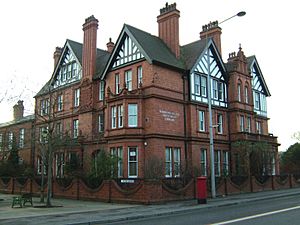Working Class Movement Library facts for kids
Quick facts for kids Working Class Movement Library |
|
|---|---|
 |
|
| Working Class Movement Library | |
| Country | England |
| Scope | Working class |
| Coordinates | 53°29′03″N 2°16′23″W / 53.48417°N 2.27306°W |
| Website | www.wcml.org.uk |
The Working Class Movement Library (WCML) is a special place in Salford, Greater Manchester, England. It holds a huge collection of books, magazines, old papers, and items. These things tell the story of how working people in England created groups and movements. This all happened because of the Industrial Revolution, a time when factories and new ways of working changed society a lot.
History of the Library
The library started thanks to two people who loved books, Eddie Frow and Ruth Haines. They met in 1953 at a summer school. In 1956, they moved in together and combined their book collections. This was the very beginning of the Working Class Movement Library.
They spent their free time and money traveling all over Britain. They were always looking for new items to add to their growing collection. By 1960, the collection was so important that historians and university experts were using it. Other people who collected items about workers' rights also started to help them. In 1964, the library became a charitable trust. This means it was set up to do good for the public, not to make money.
By the mid-1980s, their collection had completely filled their home! Salford City Council decided to help the library. In 1987, they gave the WCML and the Frows a new home. This new home was Jubilee House, a building that used to be a home for nurses. It's located near the University of Salford. The building was built in 1897 by Henry Lord to celebrate Queen Victoria's special anniversary.
In 2007, the library's setup changed. The trust that runs the library took full responsibility for the building and its staff. The council still helps by letting them use the building and giving them money each year. Other money for the WCML comes from trade unions (groups that support workers) and from people who donate.
What the Library Collects
The library focuses on the history of working-class people. It looks at their political groups, their jobs, their social lives, and their culture. All of this grew out of the Industrial Revolution.
The collection has three main parts:
- The trade union movement: These are groups that work to protect workers' rights and improve their working conditions.
- The co-operative movement: These are businesses or groups owned and run by their members, like co-op shops.
- Political parties and campaigns of the left: These are groups and movements that believe in social equality and workers' rights.
The WCML has about 30,000 books! It also has journals, old newspapers, small booklets, flyers, banners, pottery, photos, personal letters, and items from different organizations. You can also find trade union symbols, badges, and other historical objects.
The library has very important collections on many historical events and people, such as:
- Thomas Paine and the radical movement of the 1790s (people who wanted big changes).
- The Peterloo Massacre (a sad event where people protesting were attacked).
- Chartism (a movement in the 1800s that fought for more rights for working people).
- The ILP and the Clarion movement (early groups that helped create the Labour Party).
- The campaign for women's right to vote.
- The General Strike (when many workers stopped work to protest).
- The National Unemployed Workers' Movement (a group for people without jobs).
- The International Brigades (people who went to fight in the Spanish Civil War).
- Newspapers and magazines from the 1970s that wanted social change.
- The Miners' Strike of 1984-85 (a big strike by coal miners).
While the library mainly focuses on Britain, it also has a large collection about Irish history from the late 1700s onwards. This part of the collection came from the libraries of two historians, C. Desmond Greaves and T. A. Jackson.
The collection also includes many cultural items. These are things like poetry, novels, pictures, plays, songbooks, and audio or video recordings.
Since 1985, the WCML has been the official archive for the GMB union. This means they keep all the important historical records for this large trade union. They also have a lot of material from engineering unions and textile unions, especially from the North West of England. They hold items from many other trade unions too.
Besides national co-operative movement materials, the WCML also has old records from local groups of the Women's Co-operative Guild. They also have magazines about co-partnership (where workers share in the business) and workers' co-operative groups.
The main political parties you'll find represented are the Labour Party and the Communist Party of Great Britain. The WCML has huge collections of their booklets, magazines, and other small items. Many smaller political parties and campaign groups are also represented with similar materials. The library also holds old records from groups like the National League of the Blind and Disabled, Manchester CND (a group against nuclear weapons), Manchester Unity Theatre, and the Jubilee Group.

